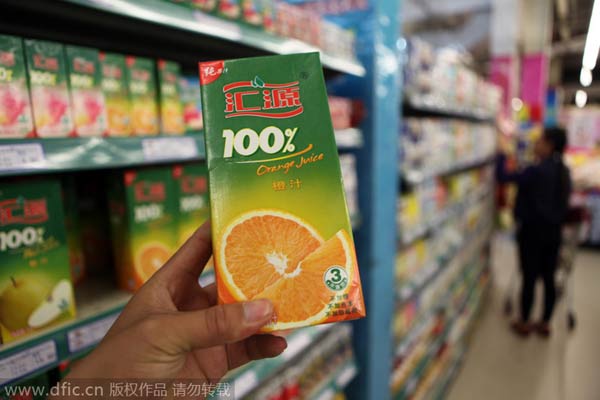Huiyuan Juice eyes Australian farms
By Zhu Wenqian (chinadaily.com.cn) Updated: 2014-11-26 13:54
 |
|
A customer buys a carton of Huiyuan orange juice at a supermarket in Rizhao city, East China's Shandong province, May 7, 2014. [Photo/IC] |
China Huiyuan Juice Group Limited, the largest privately owned juice producer in China, plans to invest in the agricultural resources in Australia by acquiring one or two farms. The company is studying the acquisition details.
"Huiyuan has long planned to invest in Australian agriculture. We visited five farms in Australia this year, and we are going to buy one or two of them," said Zhu Xinli, chief executive of China Huiyuan Juice Group Limited. "The company is researching the potential product output of the Australian farms we will buy. We might foster cows, sheep, grains, or import finished products to China."
The Hong Kong-listed juice producer's major products range from fruit juice, vegetable juice, to bottled water, tea drinks and dairy drinks. In addition to beverage producing, the company enlarged its layout at the agricultural sector this year, gearing at health preserving agriculture. Currently, the company is actively setting up its upstream industry by investing in 19 agricultural projects in 13 provinces nationwide.
Meanwhile, the Beijing-based juice manufacturer will expand its business in pasture investment. In October, the company imported dairy cows that worthy more than 50 million yuan ($8.14 million) from New Zealand into a demonstration base in Heilongjiang province in Northeast China. Huiyuan is going to put in an additional 2 billion yuan in constructing production lines of juice and dairy products, as well as building agricultural ecological park in Heilongjiang province.
Zhu said the investment in farms and pastures will provide high quality organic fertilizers and guarantee the food safety of Huiyuan products. He said the company plans to build more agricultural bases in Europe, Africa and Oceania in the near future.
Analysts said the significance of the upstream value of juice products has not get enough awareness from the public compared to dairy products, and it will become increasingly prominent amid food safety concerns.
- Cash crunch fans expectation on RRR cut
- US extends antidumping duties on China's thermal paper
- Modern food van with ancient look in Shanghai
- China home prices continue to cool in November
- Asia's top 3 billionaires all Chinese
- Old investment remedy the treatment for China's "new normal"
- China's solar sector opposes US anti-dumping ruling
- BMW to recall 846 cars in China
















